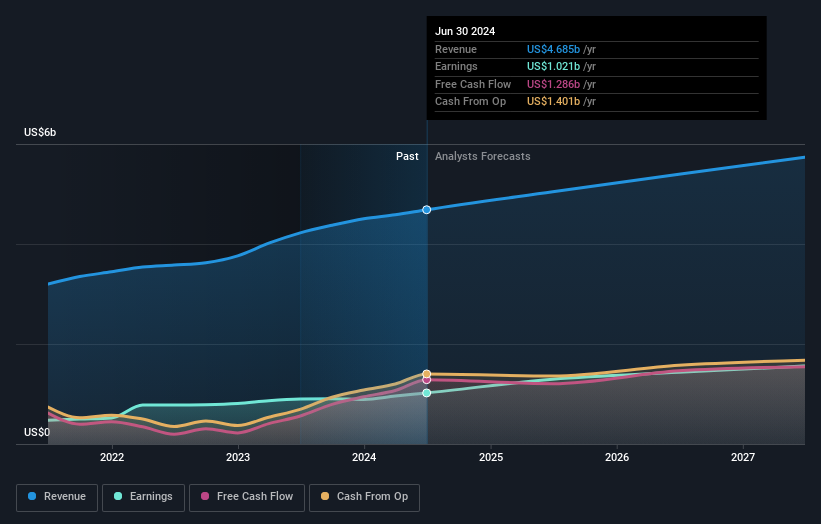- United States
- /
- Medical Equipment
- /
- NYSE:RMD
Institutional investors control 74% of ResMed Inc. (NYSE:RMD) and were rewarded last week after stock increased 8.1%

Key Insights
- Given the large stake in the stock by institutions, ResMed's stock price might be vulnerable to their trading decisions
- A total of 20 investors have a majority stake in the company with 50% ownership
- Recent sales by insiders
A look at the shareholders of ResMed Inc. (NYSE:RMD) can tell us which group is most powerful. With 74% stake, institutions possess the maximum shares in the company. Put another way, the group faces the maximum upside potential (or downside risk).
And things are looking up for institutional investors after the company gained US$2.7b in market cap last week. The one-year return on investment is currently 56% and last week's gain would have been more than welcomed.
Let's delve deeper into each type of owner of ResMed, beginning with the chart below.
View our latest analysis for ResMed

What Does The Institutional Ownership Tell Us About ResMed?
Institutions typically measure themselves against a benchmark when reporting to their own investors, so they often become more enthusiastic about a stock once it's included in a major index. We would expect most companies to have some institutions on the register, especially if they are growing.
We can see that ResMed does have institutional investors; and they hold a good portion of the company's stock. This implies the analysts working for those institutions have looked at the stock and they like it. But just like anyone else, they could be wrong. It is not uncommon to see a big share price drop if two large institutional investors try to sell out of a stock at the same time. So it is worth checking the past earnings trajectory of ResMed, (below). Of course, keep in mind that there are other factors to consider, too.

Investors should note that institutions actually own more than half the company, so they can collectively wield significant power. Hedge funds don't have many shares in ResMed. The Vanguard Group, Inc. is currently the largest shareholder, with 14% of shares outstanding. BlackRock, Inc. is the second largest shareholder owning 8.2% of common stock, and Australian Super Pty Ltd holds about 4.8% of the company stock.
Looking at the shareholder registry, we can see that 50% of the ownership is controlled by the top 20 shareholders, meaning that no single shareholder has a majority interest in the ownership.
While studying institutional ownership for a company can add value to your research, it is also a good practice to research analyst recommendations to get a deeper understand of a stock's expected performance. There are a reasonable number of analysts covering the stock, so it might be useful to find out their aggregate view on the future.
Insider Ownership Of ResMed
While the precise definition of an insider can be subjective, almost everyone considers board members to be insiders. The company management answer to the board and the latter should represent the interests of shareholders. Notably, sometimes top-level managers are on the board themselves.
I generally consider insider ownership to be a good thing. However, on some occasions it makes it more difficult for other shareholders to hold the board accountable for decisions.
Our most recent data indicates that insiders own less than 1% of ResMed Inc.. As it is a large company, we'd only expect insiders to own a small percentage of it. But it's worth noting that they own US$283m worth of shares. It is good to see board members owning shares, but it might be worth checking if those insiders have been buying.
General Public Ownership
With a 26% ownership, the general public, mostly comprising of individual investors, have some degree of sway over ResMed. While this group can't necessarily call the shots, it can certainly have a real influence on how the company is run.
Next Steps:
It's always worth thinking about the different groups who own shares in a company. But to understand ResMed better, we need to consider many other factors. Take risks for example - ResMed has 1 warning sign we think you should be aware of.
Ultimately the future is most important. You can access this free report on analyst forecasts for the company.
NB: Figures in this article are calculated using data from the last twelve months, which refer to the 12-month period ending on the last date of the month the financial statement is dated. This may not be consistent with full year annual report figures.
New: AI Stock Screener & Alerts
Our new AI Stock Screener scans the market every day to uncover opportunities.
• Dividend Powerhouses (3%+ Yield)
• Undervalued Small Caps with Insider Buying
• High growth Tech and AI Companies
Or build your own from over 50 metrics.
Have feedback on this article? Concerned about the content? Get in touch with us directly. Alternatively, email editorial-team (at) simplywallst.com.
This article by Simply Wall St is general in nature. We provide commentary based on historical data and analyst forecasts only using an unbiased methodology and our articles are not intended to be financial advice. It does not constitute a recommendation to buy or sell any stock, and does not take account of your objectives, or your financial situation. We aim to bring you long-term focused analysis driven by fundamental data. Note that our analysis may not factor in the latest price-sensitive company announcements or qualitative material. Simply Wall St has no position in any stocks mentioned.
About NYSE:RMD
ResMed
Develops, manufactures, distributes, and markets medical devices and cloud-based software applications for the healthcare markets.
Flawless balance sheet with solid track record and pays a dividend.

